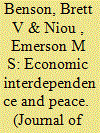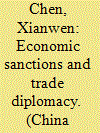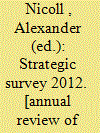| Srl | Item |
| 1 |
ID:
077671


|
|
|
|
|
| Publication |
2007.
|
| Summary/Abstract |
Most of the contemporary policy debate regarding economic interdependence and peace has focused on devising responses either in favor of or in opposition to the prevailing notion that trade is positively and unconditionally correlated with peace. The China and Taiwan case-noteworthy for the simultaneous presence of an ever-increasing economic interdependence and an adversarial political relationship-provides an interesting counter-example to the leading positions in the literature. What is missing in the literature is a model that studies states' decisions to trade and initiate conflict as a function not only of their own utility but also of their perceptions about how their opponent will respond. States' decisions to trade depend on the likelihood that their prospective trade partner will initiate a conflict, and decisions to initiate a conflict depend on perceptions of the likelihood that the target will concede. In this article, the authors develop a model that expands the domain of the trade-peace analysis by endogenizing and analyzing states' decisions to trade and initiate conflicts
|
|
|
|
|
|
|
|
|
|
|
|
|
|
|
|
| 2 |
ID:
144073


|
|
|
|
|
| Summary/Abstract |
This article confirms that China’s economic sanction in the form of restricting salmon imports from Norway was in retaliation for the 2010 Nobel Peace Prize awarded to a Chinese dissident. By combining personal accounts of stakeholders interviewed in the Norway–China salmon trade with an examination of trade data, there is strong evidence that links changes in trade patterns of fresh/chilled whole Norwegian salmon to border measures applied in response to the peace prize. While disproportionate border measures targeting Norwegian salmon have distorted China’s market since 2011, private actors appear to have busted the sanction by circumventing these measures, including rerouting, falsifying country-of-origin certification, and smuggling. This could have long-term consequences for trade patterns and quality. Official statistics record a reduced Norwegian market share and decreased Norway–China salmon trade despite an expansion of the volume of Chinese imports. However, official data do not record Norwegian salmon entering illegally, which some stakeholders estimate at between 50 and 70 per cent of the market. Norway’s official refusal to meet the Dalai Lama in May 2014 suggests that China’s sanction has affected foreign policy. The salmon sanction demonstrates that China has become more assertive in its international relations.
|
|
|
|
|
|
|
|
|
|
|
|
|
|
|
|
| 3 |
ID:
115449


|
|
|
|
|
| Publication |
London, Routledge, 2012.
|
| Description |
416p.pbk
|
| Contents |
Inclouds Index
|
| Standard Number |
9781857436532
|
|
|
|
|
|
|
|
|
|
|
|
Copies: C:1/I:0,R:0,Q:0
Circulation
| Accession# | Call# | Current Location | Status | Policy | Location |
| 056845 | 355.033505/NIC 056845 | Main | On Shelf | General | |
|
|
|
|
| 4 |
ID:
081301


|
|
|
|
|
| Publication |
2008.
|
| Summary/Abstract |
This paper aims to present a clear discussion of the history of U.S. sanctions against the Democratic People's Republic of Korea (DPRK) in order to place current and future measures in context. A brief review of phases in the U.S. economic policy toward the DPRK is followed by a longer section tracking the major changes in U.S. sanctions against North Korea over the past six decades. The paper concludes with a summary of U.S. sanctions against North Korea from 2000 until June 2007, and a timeline listing major events in U.S.-DPRK relations and the imposition and relaxing of U.S. sanctions.
This paper was written as economic sanctions against North Korea were a prominent bilateral bargaining chip in the multilateral effort to end North Korea's nuclear weapons programs. The February 13, 2007, "Initial Actions for the Implementation of the Joint Statement" declares that the United States will "begin the process" of removing North Korea from the "State Sponsors of Terrorism" list as well as "advance the process" of changing the DPRK's status under the Trading with the Enemy Act and subsequent laws that replaced that Act. News reports following the October 3, 2007, release of the "Second-Phase Actions for the Implementation of the Joint Statement" indicate that the removal from the terrorism list could come by the end of 2007. There is likely to be public debate in the United States about whether North Korean actions have been sufficient to warrant these changes to its status, particularly if it is confirmed that North Korea was aiding Syria in the development of a nuclear weapons program
|
|
|
|
|
|
|
|
|
|
|
|
|
|
|
|